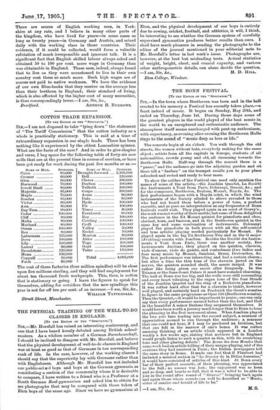THE BONN FESTIVAL. [To THE EDITOR OF THE " SPF.CTATOR."1
Sin,-In the town where Beethoven was born and in the hall erected to his memory a Festival has recently taken place,-a feast indeed of music. It began on Sunday, May 28th, and ended on Thursday, June 1st. During those days some of the greatest players in the world played of the best masks in the world to an enraptured and enthusiastic audience. The atmosphere itself seems surcharged with pent-up enthusiasm, with expectancy, as evening after evening the Beethoven Halle rings to the sound of " music deep as love or life."
The concerts begin at six o'clock. You walk through the old streets, the women without hats, everybody making for the same object : artists from all the capitals in Europe, students of all nationalities, crowds young and old, all streaming towards the Beethoven Halle. Half-way through the concert there is a "pause," and the audience go into the adjoining garden and sit there till a " fanfare" on the trumpet recalls you to your place refreshed and rested and ready to hear more.
To show the calibre of the Festival one need only mention the names of some of the artists,-the Joachim Quartet, La Societe des Instruments h Vont from Paris, Dohnanyi, Busoui, Sm.; and for the composers, Beethoven, Brahma, Mozart, Haydn, &c. The first performance began with a Haydn octet, in which the wind instruments of the Society alluded to above revealed to those who had not beard them before a power of tone, a perfect ensemble, and as pure an interpretation as any frequenter of Bonn festivals could wish. They played again in an octet of Gouvy's ; the work was not worthy of their mettle, but some of them delighted the audience in the Eh Mozart quintet for pianoforte and oboe, clarinet, horn, and bassoon, and in the Beethoven quintet in the same key and same combination of instruments. Dohnanyi played the pianoforte in both pieces with all the self-control and true artistic playing needed particularly for Mozart. • He played again in the big Eh Beethoven Trio and in the G major (Prehiing) sonata with Joachim. Besides the Societe dos Instru- ments it Vent from Paris, there was another society, Des Instruments Anciens ; they played on the quinton, clavecin, viole d'amour, violo do gambe, and contrabasse (two ladies and four men) music by Mount, Saochini, Bruni, Destouchos, doe. The first performance was interesting and had a certain charm ; but after a time the, thin tone of the clavecin jarred on the nerves, the quinton sounded shrill, tile music insipid. It was rather like being given eau merge after Burgundy. In the Trianon or the Sans-Souci Palace it must have sounded charming. Tho hall at Bonn was too big, and the walls wore still resounding and every heart vibrating to the organ tone of the four Strada of the Joachim Quartet and the ring of a Beclistein pianoforte. It was rather hard after that for a clavocin to tinkle, however well played, and certainly hard on Frederick the Great's sonatas to figure in the same programme as Opus 110 (Beethoven sonata). Then the Quartet,-it would be impertinent to praise; one can only say that every performance seemed bettor than the last, and that in the beautiful A minor Brahma they surpassed themselves. It would have been worth a journey much longer than to Bonn to hear the phrasing in the first movement alone. When Joachim played the two solo bars leading into the second subject, a murmur of appreciation seemed to run through the audience ; a murmur that one could not hear, if I may be pardoned an Irishism, but that one felt in the marrow of one's bones. It was rather amusing thinking of an article which appeared in a London weekly a few weeks ago, stating that nowhere but in England would people listen to such a quartet as this, with its scratching tone and other glaring defects ! The Revue des d.oun blondes that same week had an article telling of their unique playing, and of the ovations they had received in Paris ; the Italian newspapers tell the same story in Rome. It made one feel that if Flaubert had included a musical section in "Lo Dossier do la Betise humaine," it would have consisted of articles of this kind. At Bonn every bar of their perfect ensemble, of their phrasing, was appreciated to the full ; no nuance was lost; the enjoyment was so keen and so deep, and hearts so full, that it was a relief to be able to join in the round after round of " Bravos !" bringing back again and again those whose sounds can well be described as " Music, sister of sunrise and herald of life to be."






































 Previous page
Previous page